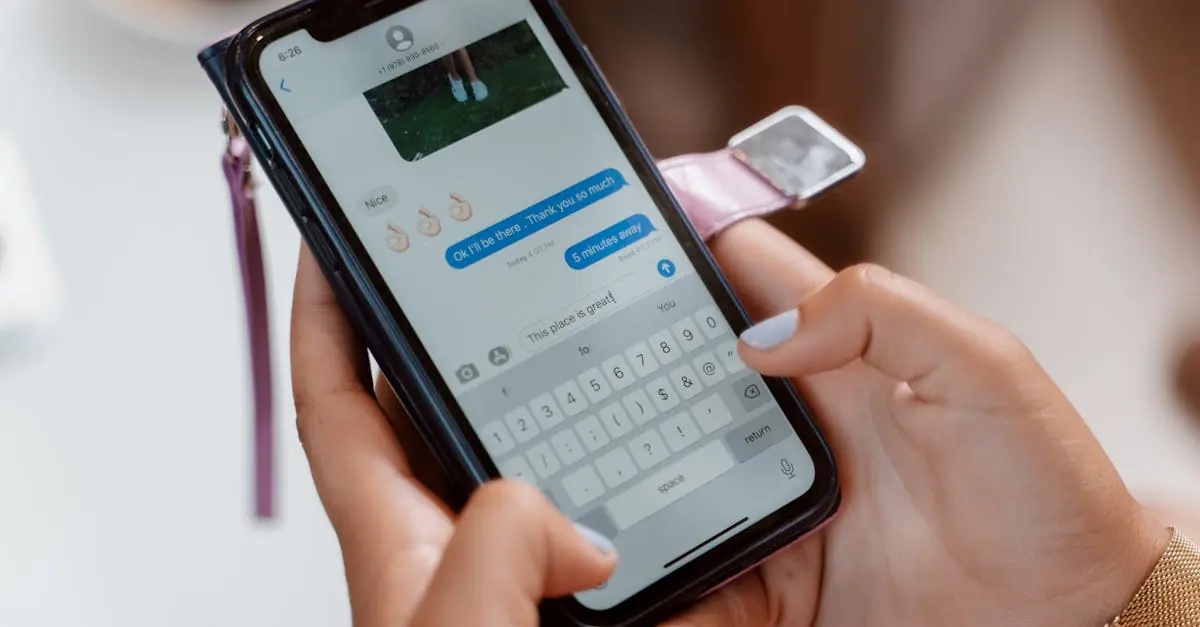Table of Contents
ToggleIn a world where your secrets could be just a screenshot away, sending secure text messages on an iPhone is like fortifying your digital fortress. Imagine your texts being as safe as a squirrel hoarding acorns for winter—nobody wants to share their stash! With the right tools and tricks, you can keep your conversations private and free from prying eyes.
Understanding Secure Text Messaging
Secure text messaging ensures privacy for conversations by employing various encryption methods. End-to-end encryption keeps messages confidential, so only the sender and receiver can read them. Several messaging apps, including iMessage, utilize strong encryption protocols, which protect data during transmission.
Users benefit from enabling features like two-factor authentication, adding an additional security layer. This approach ensures that even if someone gains access to the device, they still require a second verification to access accounts and messages. Regular updates for both the iOS and messaging apps help patch security vulnerabilities, enhancing protection against potential threats.
Encrypting backups also plays a crucial role in safeguarding messages. When users back up their devices, encrypted backups prevent unauthorized access to stored information. Additionally, employing secure practices, such as avoiding public Wi-Fi for sensitive discussions, contributes to overall safety.
By using secure messaging apps and features, individuals can minimize their risk of interception. It’s essential to remain cautious and aware when sharing personal or sensitive information. Following best practices for secure text messaging enables users to maintain the confidentiality of their conversations while communicating digitally.
Built-In Secure Options on iPhone
iPhone offers built-in secure options for text messaging, ensuring user privacy during conversations. The following features enhance message protection.
iMessage Encryption
iMessage uses end-to-end encryption, meaning messages cannot be read by anyone except the sender and receiver. This technology secures messages in transit, preventing unauthorized access. Automatic encryption ensures that user data remains shielded when sent over the internet. Users benefit from security keys that enable verification of message authenticity. Strong encryption protocols protect personal conversations, making iMessage a top choice for secure communication.
FaceTime Security Features
FaceTime provides a secure platform for audio and video calls, using encryption similar to iMessage. Only participants of a call can access the audio and visual data, maintaining confidentiality. Authentication ensures that users connect to verified contacts only. Regular updates to the FaceTime app enhance security measures, making it harder for hackers to exploit potential vulnerabilities. Users enjoy peace of mind knowing that FaceTime offers robust security when communicating privately.
Third-Party Apps for Secure Messaging
Many users seek third-party apps to enhance secure messaging on iPhones, offering additional features and heightened privacy. Several options prioritize encryption and user-friendly interfaces.
Popular Apps Overview
Signal, WhatsApp, and Telegram stand out as popular secure messaging apps. Signal uses end-to-end encryption for all messages, voice calls, and video calls, ensuring that only intended recipients can access content. WhatsApp also implements end-to-end encryption but additionally includes features like disappearing messages for further confidentiality. Telegram provides a unique option with its secret chat feature, which utilizes end-to-end encryption and allows messages to self-destruct after a set time.
Comparing Features and Security
Security features differ significantly among these apps. Signal encrypts metadata, offering users maximum privacy, while WhatsApp contains features like two-step verification, enhancing account security. Telegram’s secret chat feature secures only selected conversations, with regular chats relying on server-side encryption. Additional tools like self-destructing messages and disappearing media also provide unique layers of security. Users should evaluate these aspects in choosing the most suitable app for their messaging needs.
Best Practices for Secure Text Messaging
Following best practices for secure text messaging enhances privacy and protects sensitive conversations. Adopting these measures ensures better security on the iPhone.
Using Strong Passwords
Passwords act as the first line of defense against unauthorized access. Users should create complex passwords that include a mix of letters, numbers, and symbols, making them harder to guess. Enabling password protection on messaging apps adds an extra layer of security. Changing passwords regularly also minimizes risks associated with potential breaches. Implementing two-factor authentication can further strengthen security, requiring a second verification step before access is granted. Users must prioritize the use of strong passwords to safeguard their communications effectively.
Regularly Updating Apps
App updates often include important security patches that address newly discovered vulnerabilities. Regularly updating messaging applications helps protect against emerging threats. iPhone users should check for updates in the App Store and install them promptly. App developers frequently enhance encryption methods and security features in new versions. Ignoring updates can leave devices exposed to risks, minimizing the effectiveness of existing security protocols. Ensuring both iOS and messaging apps are up to date significantly bolsters overall security for text messaging on iPhones.
Securing text messages on an iPhone is essential for protecting personal information in today’s digital landscape. By utilizing features like end-to-end encryption and enabling two-factor authentication users can significantly enhance their messaging security. Regularly updating iOS and messaging apps ensures that the latest security measures are in place.
Choosing the right messaging app also plays a vital role in maintaining privacy. Apps like Signal, WhatsApp, and Telegram offer robust encryption options tailored to different needs. Implementing best practices such as strong passwords and avoiding public Wi-Fi for sensitive conversations further strengthens overall security. With these strategies in place, users can communicate confidently knowing their messages remain private and secure.





